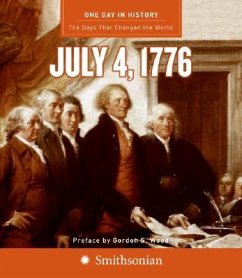On a summer day in July, 1776, in Philadelphia, Pennsylvania, the world changed forever. On July 4, thirteen English colonies on the continent of North America decided to declare themselves free and independent states, united in their purpose of forming a new nation. The approval of that decision on July 4 represented the culmination of lengthy debates. As the delegates filed into the State House on Thursday, July 4, tempers were flaring. Despite entreaties from others, the New York delegation continued to balk. They had no instructions from the state and could vote against the resolution. Furthermore, it looked as if the two delegates from Delaware were deadlocked. Unless Caesar Rodney arrived in time for the vote, July 4, 1776, promised to be just another day of delay and political wrangling. "One Day in History: July 4, 1776" is a look at how one day changed the course of history; in this case, a day that produced a new nation. Grave consequences beyond the Declaration of Independence flowed from the day's events. This reference sets out in 100 articles, written by noted historians, the details of the day in history, its causes and consequences, and how the actions of July 4 resonated throughout the colonies. The words and logic of the declaration approved on July 4, as well as larger events surrounding that decision, shaped the destiny of the world, creating a new nation that would build on the principles enumerated in the document. The day is examined in its historical context, with articles ranging from "African Americans" to "Colonies or States" to "Daily Life in 1776" and "Dunlap's Broadsides." Here, in one complete reference, is a "you were there" experience ofwhat it was like to be in Philadelphia on July 4, 1776. Moreover, this book represents the cumulative effect of "one day in history": the United States as we know it today, some 230 years later.
Hinweis: Dieser Artikel kann nur an eine deutsche Lieferadresse ausgeliefert werden.
Hinweis: Dieser Artikel kann nur an eine deutsche Lieferadresse ausgeliefert werden.








